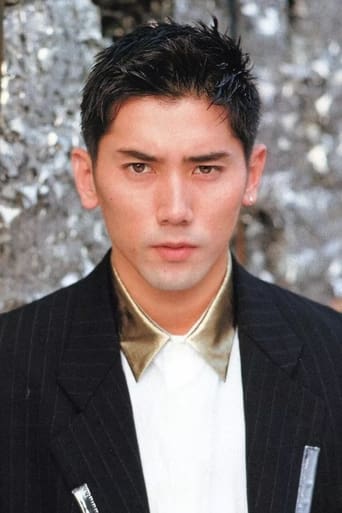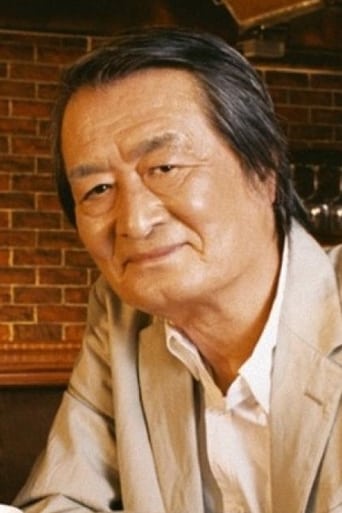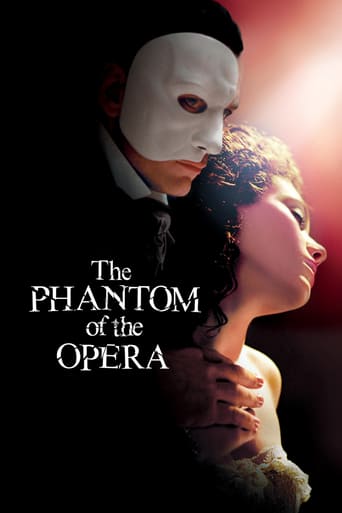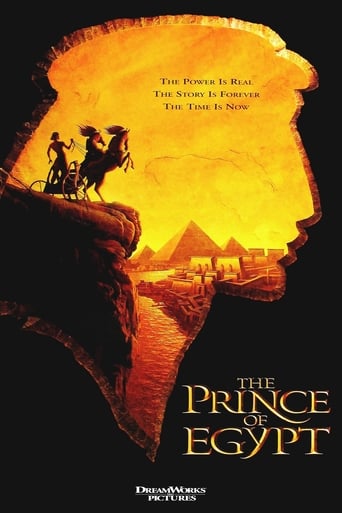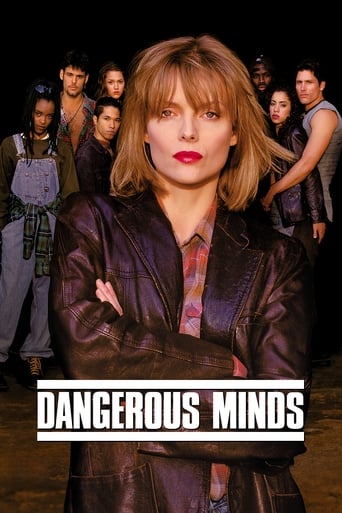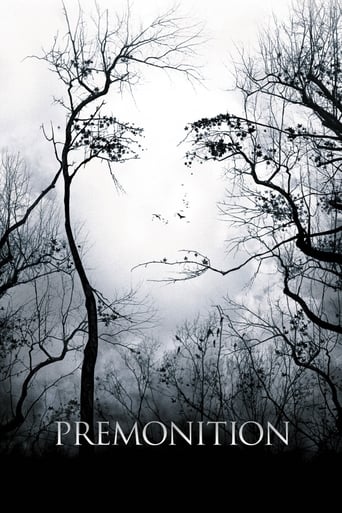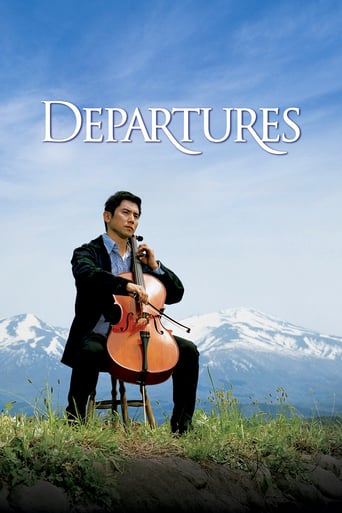
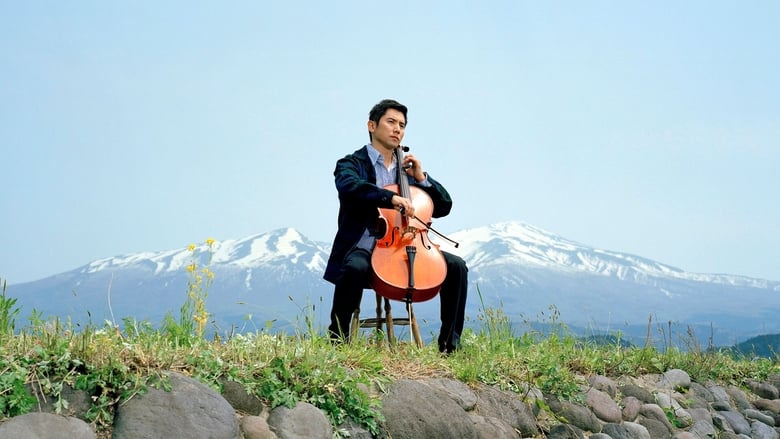
Departures (2008)
Daigo, a cellist, is laid off from his orchestra and moves with his wife back to his small hometown where the living is cheaper. Thinking he’s applying for a job at a travel agency he finds he’s being interviewed for work with departures of a more permanent nature – as an undertaker’s assistant.
Watch Trailer
Cast


Similar titles
Reviews
To paraphrase Nobu-san, our guide around the Okunoin cemetery at Koya-san: "In Japan, when we are born, we have Shinto rituals. When we die, we have Buddhist rituals. My mum got married in a church: New Caledonia." Buddhism in Japan is often associated with death. When one dies, the ceremonies that take place will often be Buddhist, but as Donald Richie explores, these could be as much for functional purpose as religious belief. But, obviously of course, no one knows what actually happens when you die. Or do we? It depends whether one is thinking about it from the perspective of the body or the soul. Yojiro Takita's Oscar-winning 2008 "Departures" see cellist Daigo's (popular hair model Masahiro Motoki) orchestra disband in Tokyo, leaving him doubtful of his talent and so his future. On a whim, he convinces his wife - with little coercion - into moving back to his small hometown in Yamagata, moving into the cafe his mother left him. Needing work, he responds to an ad with few details, but nice pay packets, and is immediately hired. It soon turns out that his job will be as an "encoffinfer", performing the Japanese noukan ritual of preparing the body before it is placed into the coffin (and then burnt, of course). Not an easy job, he struggles to cope at first and soon feels society's evil eyes once his new job is learnt: perceived as a dirty man for his handling of dead bodies. As the film progresses, so does his skill, winning over his doubters, including his wife, and finding what would appear to be a true calling: sending the bodies of the recently deceased on their final journey, coming to terms with some of the opportunities missed in life. Ten years earlier, Kore-eda Hirokazu released his second feature film: 1998's "After Life" (or perhaps its more appropriate Japanese title "Wandafuru Raifu"). Here, there after life probably isn't quite what you expected. Upon dying, you enter a somewhat New England-esque academic building, taking a ticket as if a doctor's waiting room. On this "Monday morning", you are assigned a counsellor who will pose you the situation: You have a week to choose the one memory of your life which you will take with you for eternity. This memory is recreated by a somewhat haphazard film crew, starring your good self, and the film is then shown to you in a cinema. Once viewed, you disappear for eternity, locked in that memory. Somewhat fanciful, the counsellors are all people that were either unable, or refused, to make the choice, and thus stay in a purgatory of administration and archiving, forever reliving Monday morning. A series of interviews are conducted with the various recently deceased, with now long-experienced - but still youthful in look - Takashi (Arata) given the task of counselling the man who married his fiancée after he died. Opening up some old wounds, Takashi spends the week contemplating his own favourite memories and finally makes his choice.The outlooks of the two films are quite different in their thoughts on death. "After Life" plays little on the sadness of having died. Those that enter are quite chipper, one must say, on learning that they've just kicked the bucket. As the Japanese title suggests, it's very much about celebrating the most precious, and wonderful, memories that we have of our lives. This could perhaps be down to Kore-eda's combination of actors and real-life ordinary folk discussing their favourite memories. Using his documentary skills, this is as much an exploration of memory than a mourning of death. "Departures", however, is very much aware of the sadness of death. Very reminiscent of Shunji Iwai's "Love Letter" in numerous ways, there are moments of sentimentality, tugging at the heartstrings, as well as plucking on the cello strings. Tears and emotion run throughout; the sadness of the families a key theme. A shot of a young child's body being prepared for their coffin accompanied by their smiling photo, hitting home the sadness in the simplest of ways. Though family tears and timely music perhaps dominate, going for more conventional crowd-(dis)pleasing. This is absent from "After Life", laying people's memories out before them to celebrate and chew on; more philosophical than sentimental. If death hurts those left behind, "After Life" is the memories of life for the deceased; whereas "Departures" is the final memory for the mourners. If we're looking at religion in Japanese death, however, "After Life" perhaps lacks any religion. Death is a bureaucratic process than a passing over. As seen in other films, such as Tim Burton's "Beetlejuice", death is likened to the administrative Hell on Earth of waiting rooms, form-filling and box-ticking. It's also a strange film in that it's very much of its time, serving as a time capsule, with the provision of lo-fi VHS cassette tapes for "clients" to view moments from their lives to help them in their choice. Surely the after life's administrative team can come up with a less archaic system! The recreations also seem to be more "human" and of the "real world", made to a seemingly small budget and limited time frame, far from Hollywood glitz and glam that many of the dead may have wished to achieve in the film of their life. A theme running throughout Kore-eda's body of work, this is perhaps as much a comment on the modern nature of memory and how we try to recreate it in permanent form rather than live in the moment of emotion. A comment as relevant now as ever. "Departures" features the religious ceremony of the noukan, placing the body in ritual dress, with accompanying make-up. But with even this dying out with the elderly, it perhaps reflects Richie's doubts as to the true religious nature of these "performances". Making the dead look their best is perhaps purely for aesthetic purposes, giving mourners one last perfect memory. Daigo's skill is very much in-line with Japanese aesthetics: The almost perfect folding with due care and attention of the deceased clothes, creating an intimate one-on-one with the body. "After Life", with its counsellors getting deep into their clients personal lives and directing them towards their perfect choice: Ones who struggle are probed to search deeper; those who go obvious, are challenged to look more inwards, creating an intimate one-on-one with the soul. Mono no aware, the Japanese sense of the fleeting nature of beauty and the impermanence of all things is alive in both films. Daigo's hard work and skill is - for want of a better word - in vain; the bodies made beautiful, only to be burnt at cremation soon after. "After Life" forces the choice of the single moment that defines a whole existence (and they only give you a week!). The last memory for the living versus the eternal memory for the dead; and perhaps a more Japanese sense of religion than any organised belief system.politic1983.blogspot.co.uk
Although the start of the film is a bit slow paced for my taste, I really love the comedic aspects that were incorporated into this film. When I realized what the movie was about, I originally thought that it was going to be a very slow movie about a very serious topic. I was wrong, I loved how the director found some way to add comedy into such a serious topic such as funerals. One of my favorite scenes was when Daigo was forced to wear a diaper and act as the corpse that the man was performing the ceremony on. His facial expressions where quite amusing and really lightened the mood of what could have been a very sad topic.
Departures is an okay movie about a former orchestra cellist who has to move back home, to the countryside, with his wife. Diago, the husband and main character, finds a job as a traditional mortician. However dealing with the dead is considered a shameful job. Though being a mortician is shameful in a lot of cultures. I thought the way Diago prepares a body for a funeral was interesting; however, I would not want to do it myself. On another note, I did not care too much for the wife. I understand that she was trying to be supportive, but she did not seem like a real person to me. The only time she really got upset is when she found out that Diago was mortician. However, that might just be a cultural difference. From this movie the wife seems to take care of the husband and be a "dutiful wife", but in the US women are more outspoken.
... and i have seen an uncountable number of them! Actually it had been a long time before such a piece of Art film came on my screen. Right then, out of the sudden, i heard the announcement on our national TV stations that they were going to play "departures", a film which was the Oscar winner for best non English speaking film of that year! The fact that it was Japanese and the synopsis of its script was nothing i was really enthusiastic about, and i would have probably missed it if i didn't read the reviews which were all very strongly recommending it. So, finally i found myself, that Sunday evening watching "departures", and a miracle happened! the -at the beginning macabre- script, became gradually more and more touching, then sad and finally heartbreaking, humanistic and tender so much, that it finally got me totally upside down out of emotion. Till that moment I had never come across anything like this! How could it be possible that something which could - at first sight- be considered "macabre" end up so heartbreaking? Only a real highly humanistic masterpiece could ever make it possible. And everything in this film is just a masterpiece of its own: Direction, photograph, script, acting and last but not least, its heavenly music which just frees your soul and lose your eyes to shed freely your tears! This music...Oh! there is something magic about it i tell you! That kind of music God allows from time to time to reach the earth as a present from heaven and probably as a reward for something good the humans may have done. In my case,Mr Hisaishi,the composer, through his divine music for this divine film, made me a Cello fan, and I do need to thank him for giving me this amazing feeling! If you haven't seen "Departures" yet, please try to do it soon as possible. It will fill your heart and your spirit with the finest kindness you have ever experienced coming out of a movie screen. It may make you feel emotionally shocked but it will also make you a better person for sure!


